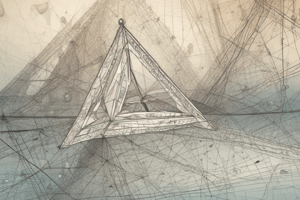Podcast
Questions and Answers
ਕੌਣ ਸੱਚਾ ਹੈ?
ਕੌਣ ਸੱਚਾ ਹੈ?
- ਯੂਕਲਿਡੀਅਨ ਜੁਰਮ ਨੂੰ ਫਲੇਟ ਪਲੇਨ ਸ਼ੇਪਸ ਦੀ ਟਿਪਾਈ ਕਰਦਾ ਹੈ।
- ਕੈਲਕੁਲੁਸ 'ਤੇ ਧ੍ਯਾਨ ਦੇ ਗੋ ਮ ਹੋ ਸੀ '
- ਹਾਈਪਰਬੋਲਿਕ ਜੁਰਮ ਸਫ਼ੇ ਵੀ ਸ਼ੇਪ ਕਰ ਸਕਦੇ ਹਨ। (correct)
- 2 + 2 = 5, 4 + 4 = 10
- ਏਲਜੇਬਰੈ ਵੱਲੋਂ ਚੰਗੀ ਤੌਰ 'ਤੇ ਵੇਰੀਅਬਲ ਨੂੰ ਪੇਸ ਕੀਤਾ ਜਾ ਦਾ ਹੈ।
ਏਲਜੇਬ੍રા 'T' 'C'?
ਏਲਜੇਬ੍રા 'T' 'C'?
- $6(7 + 5)$
- 4 x 5 + 3
- $2^3 + 3^2$
- $x^2 - y^2$
- $rac{1}{3} x - rac{1}{4} y$ (correct)
Calculus 'T' 'C'?
Calculus 'T' 'C'?
- $rac{d}{dt} rac{d}{dt} y(t)$
- $rac{dy}{dx} = x^2$
- $rac{d^2y}{dt^2} = 5t + 3$
- $rac{d}{dx} (3x^2)$
- $rac{lim}{x o rac{ u}{2}} f(x)$ (correct)
'probability theory' ਕਿ ਕिहा ਗی
'probability theory' ਕਿ ਕिहा ਗی
'Statistical methods' 'outcomes' predict 'based on'?
'Statistical methods' 'outcomes' predict 'based on'?
'Albert Einstein' ਕੀ-?
'Albert Einstein' ਕੀ-?
ਗਣਿਤ ਕੌਣ-ਕੌਣ ਸਰੋਤ ਦੇ ਨਾਲ ਸੰਬੰਧਿਤ ਹੈ?
ਗਣਿਤ ਕੌਣ-ਕੌਣ ਸਰੋਤ ਦੇ ਨਾਲ ਸੰਬੰਧਿਤ ਹੈ?
Study Notes
Exploring Mathematics
Mathematics is a vast and interconnected discipline that touches our daily lives more intimately than you might realize. At its core, math deals with abstract concepts like numbers, geometry, algebra, calculus, probability, and statistics. When we study these subjects, we unlock ways of reasoning, problem-solving, and understanding the world around us.
Numbers
The foundation of mathematics lies in basic numerals—ones, twos, threes...all the way up to infinitely large numbers! We measure time, distance, mass, temperature, and countless other phenomena using numbers. In turn, numbers help reveal patterns and relationships within those measurements.
When dealing with equations involving entire sets of numbers, we have two main categories: integers and real numbers. Integers comprise whole numbers (+ve, -ve, and zero), while real numbers consist of fractions and decimals too — making them incredibly useful when working on problems in the natural sciences, social sciences, business, finance, and technology.
Geometry
Geometric shapes form part of everyday life, from architecture to product design. They describe properties such as length, width, area, volume, perimeter, etc., which together determine spatial relationships among objects. By studying geometry, one learns how to make accurate observations, follow sequences of steps logically, identify patterns, solve problems, and develop visual skills.
Two types of geometry commonly studied are Euclidean and non-Euclidean geometries. While Euclidean geometry refers to flat plane shapes, non-Euclidean geometries describe curved spaces, including spherical and hyperbolic surfaces.
Algebra
Algebra introduces variables and represents their values by using symbols. It enables solving word problems, finding unknown quantities, and expressing relations between different elements mathematically. Linear equations and linear functions are common examples of algebraic expressions. More complex algebraic structures involve polynomials and systems of equations.
Calculus
Calculus comes into play when we need to analyze the behavior of curves and functions closely – it allows us to draw conclusions regarding change, rates of changes, and accumulations of various quantities. Applications range from motion and velocity to optimization and economics.
Probability & Statistics
Probability theory helps predict outcomes based on data through random processes, equipping students with tools needed to understand uncertainty and risk. Statistical methods allow someone to collect, organize, summarize, interpret, and communicate information obtained from experiments or surveys. These branches of mathematics find uses in fields such as medicine, psychology, sociology, sports, finance, and quality control.
In conclusion, learning mathematics opens doors to a wealth of knowledge, thinking skills, and career opportunities across diverse disciplines. Whether tinkering with simple arithmetic operations or delving deep into advanced mathematical theories, this subject demands patience, creativity, and mental agility. As Albert Einstein famously said, “Pure mathematics is, in its way, the poetry of logical ideas." So embrace your inner mathematician and unravel mysteries hidden beneath equations!.
Studying That Suits You
Use AI to generate personalized quizzes and flashcards to suit your learning preferences.
Description
Delve into the world of mathematics exploring numbers, geometry, algebra, calculus, probability, and statistics. Understand how these branches of math play crucial roles in problem-solving, logical reasoning, and real-world applications across various fields.




